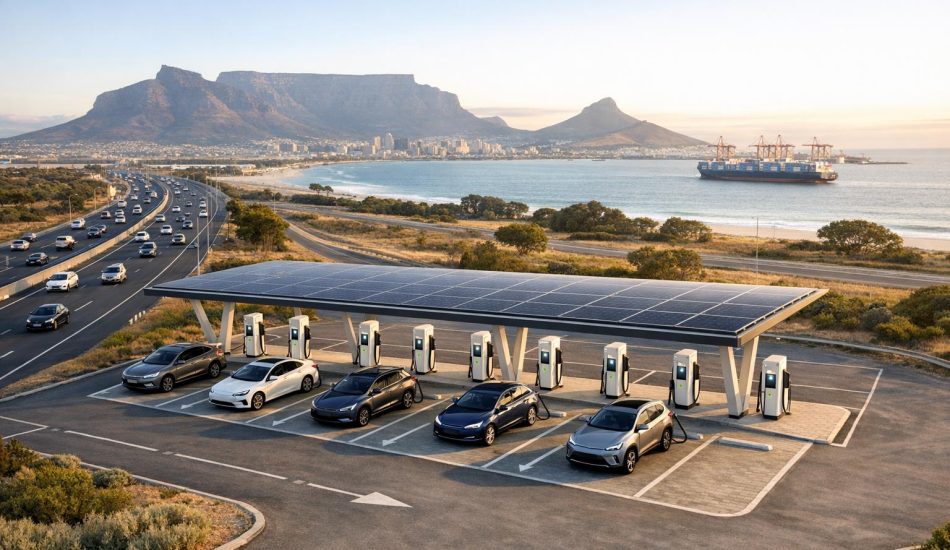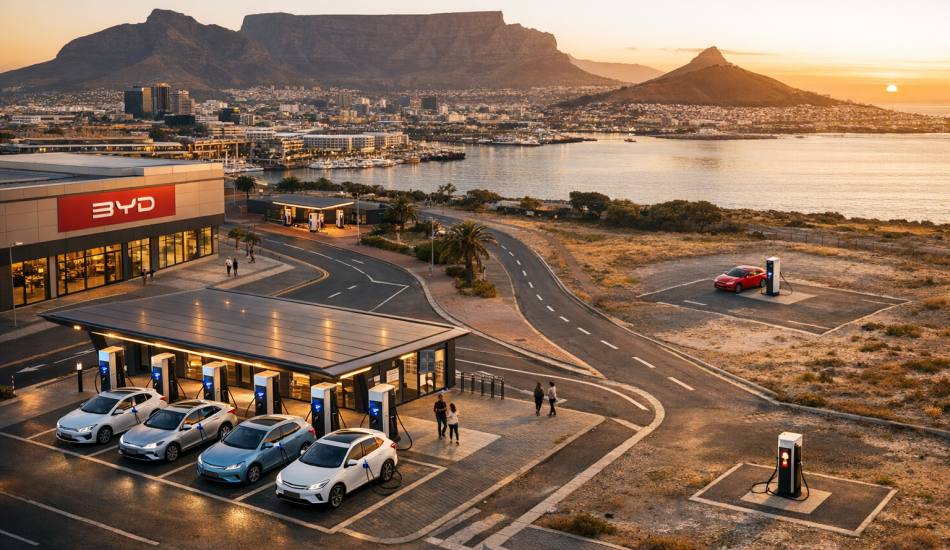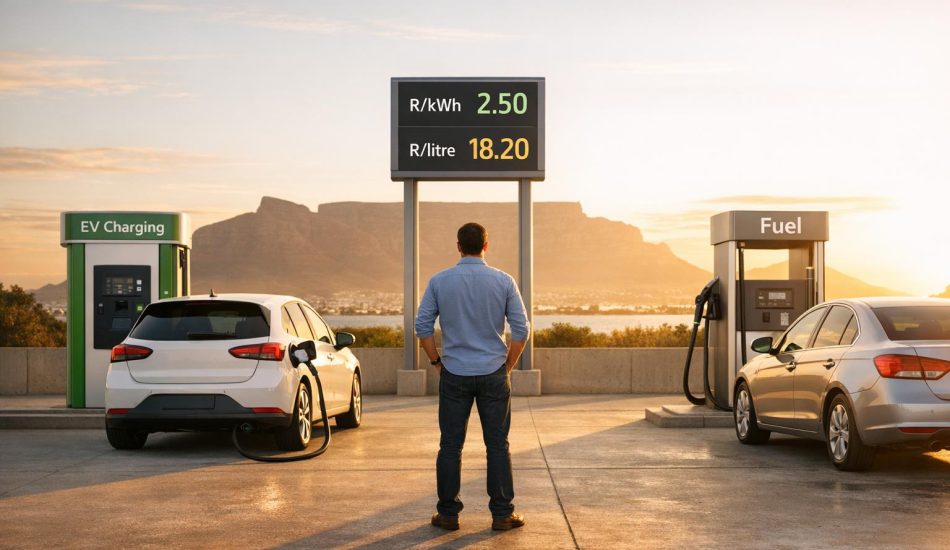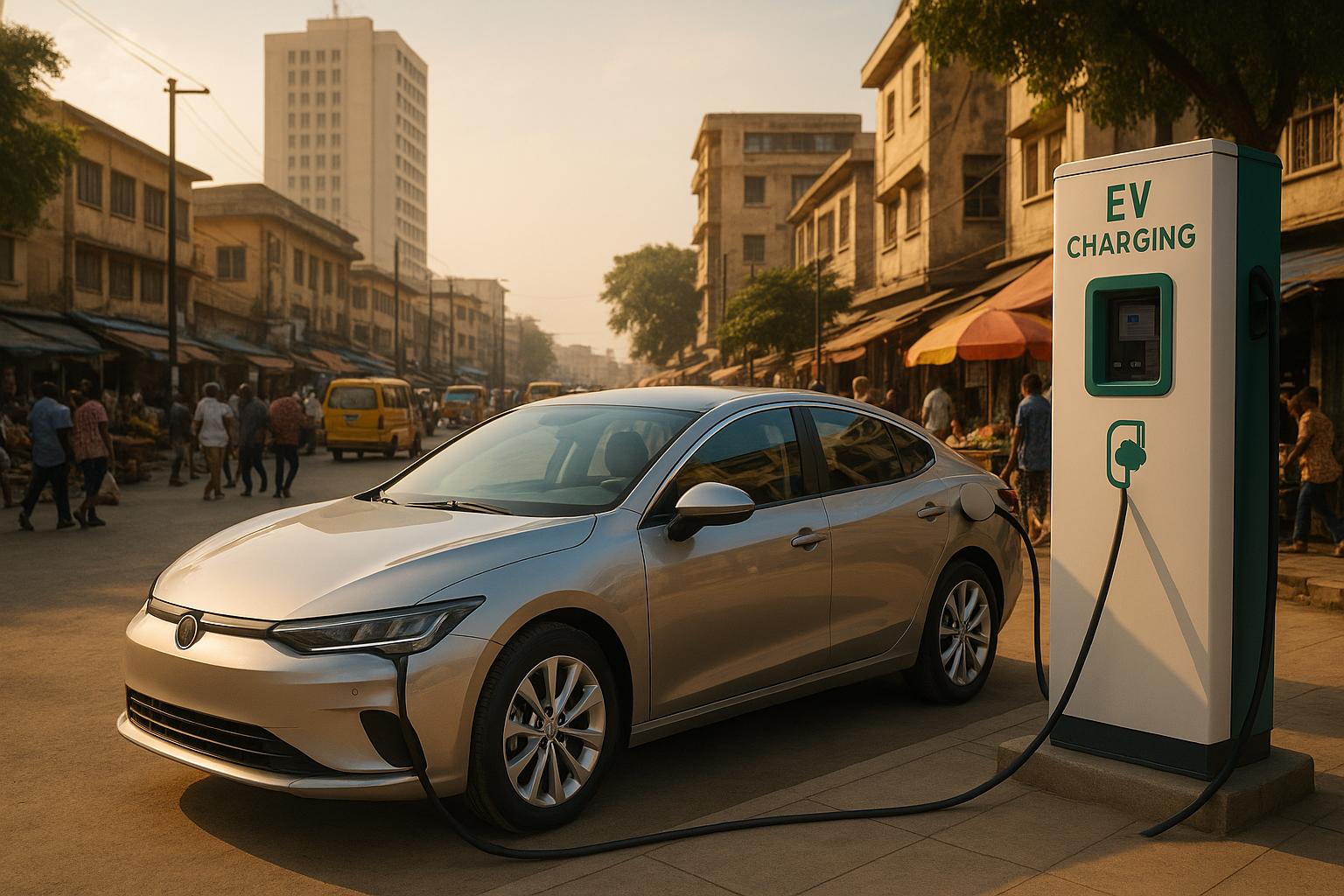
Electric cars (EVs) in Nigeria are gaining attention but face unique challenges. Here’s what you need to know:
- Charging Infrastructure: Very limited, with only a few public charging stations. Frequent power outages make home charging setups or solar-powered solutions essential.
- Cost of Ownership: EVs are expensive upfront, ranging from $10,000 to $85,000. However, lower running costs (charging and maintenance) and emerging financing options are making them more accessible.
- Road Conditions: Rough roads, flooding, and heat stress EV components. Durable models with high ground clearance and weatherproofing are better suited for Nigeria.
- Government Support: Proposed incentives like tax holidays and import duty waivers could make EVs more affordable.
While EVs offer long-term savings and reduce reliance on fuel, adoption depends on better charging networks, affordable models, and improved roads.
Charging Infrastructure: What’s Available and What’s Missing
Current Charging Stations in Nigeria
Nigeria’s electric vehicle (EV) charging network is still in its infancy, with only a handful of public stations scattered across major cities. This limited availability has become a major roadblock for EV adoption in a country long associated with oil production. Adding to the challenge is the country’s unreliable power supply, which makes it difficult to establish a consistent and dependable network of charging stations. This lack of infrastructure highlights the broader issues that need to be addressed.
Problems with Building More Charging Stations
One of the biggest hurdles to expanding Nigeria’s charging network is the erratic and unreliable power supply. Without a stable energy grid, investing in and deploying additional charging stations becomes a risky and inefficient endeavor.
Local Charging Solutions
Despite these challenges, some local solutions are beginning to take shape. There’s a growing interest in innovative, localized approaches to fill the gaps in charging infrastructure. For instance, initiatives that utilize last-mile technology are offering alternative ways to provide charging options, presenting a glimmer of hope for overcoming these obstacles.
Cost of Ownership: Can Nigerians Afford EVs?
Purchase Prices and Payment Options
Electric vehicles (EVs) in Nigeria come with steep upfront costs, making them a challenge for many buyers to afford. Prices for new EVs range between ₦15 million and ₦40 million (approximately $10,000 to $27,000), depending on the brand and model. On EV24.africa, prices vary widely – from $5,880 for the GEELY PANDA MINI BASE (with a range of 120 km) to $85,000 for luxury options like the ZEEKR 009. Mid-range choices include models such as the BYD DOLPHIN ACTIVE priced at $11,800 (340 km range), the LEAPMOTOR T03 at $12,000 (403 km range), the BYD SONG PLUS EV at $18,680 (505 km range), and the BYD TANG EV 2024 at $34,700 (730 km range).
In comparison, petrol-powered vehicles are generally more affordable upfront, which makes them a more accessible option for most Nigerians. However, flexible financing options are helping to bridge the gap. EV24.africa offers transparent pricing along with payment solutions that allow buyers to spread out costs. Similarly, some Nigerian EV companies are introducing innovative payment models like pay-as-you-go and lease-to-own systems to make EV ownership more feasible.
That said, high interest rates and limited access to credit remain significant challenges. On a brighter note, partnerships with local banks are beginning to provide auto loan options, gradually improving financing opportunities. Next, we’ll explore how charging costs and power supply challenges impact the daily expenses of owning an EV.
Charging Costs and Power Bills
Charging an EV in Nigeria comes with its own set of costs and challenges. For a 60 kWh battery, charging expenses range between ₦4,000 and ₦8,000 (roughly $2.70 to $5.40). Costs tend to be lower in cities like Lagos but rise in regions with unreliable electricity, where off-grid solutions like solar panels or generators are often required, adding to the expense.
To ease these burdens, some Nigerian EV startups are offering free charging stations for early adopters, significantly cutting down operational costs. Additionally, solar-powered charging stations are being rolled out across the country to address both cost concerns and the unreliable power grid. Over time, these measures can help EV owners save money compared to traditional fuel costs.
Money Saved Over Time and Government Help
While EVs have higher upfront costs, they tend to be cheaper to run over the long term. Charging an EV is generally less expensive than refueling a petrol car, and EVs require less maintenance since they have fewer moving parts. Owners often report substantial savings on fuel and repairs, particularly when they have access to free or subsidized charging options.
The proposed Electric Vehicle Transition and Green Mobility Bill could make EVs even more affordable by introducing government incentives. These include tax holidays, import duty waivers, toll exemptions, and direct subsidies for EV buyers. If these measures are passed, EVs could become much more competitive with petrol cars in terms of total cost.
| Cost Component | Electric Vehicles | Petrol Vehicles |
|---|---|---|
| Purchase Price | Higher upfront, but falling with incentives | Lower upfront, rising with inflation |
| Fuel/Charging | Lower per mile, especially with free or solar charging | Higher and volatile due to fuel price fluctuations |
| Maintenance | Lower (fewer moving parts) | Higher (engine, oil, frequent repairs) |
| Government Support | Tax holidays, import duty waivers, toll exemptions, subsidies | Limited or none |
Local manufacturers like Innoson and JET have ambitious plans to produce 10,000 EVs annually by 2026, taking advantage of tax incentives to reduce costs. Additionally, the National Automotive Design and Development Council has trained over 10,000 workers in EV-related skills, aiming to lower long-term maintenance costs by increasing local expertise.
While repair costs may initially be higher due to limited availability of spare parts and skilled technicians, these expenses are expected to drop as the market matures and training programs expand. With these long-term savings and supportive policies, EVs are steadily becoming a more practical and cost-effective choice for Nigerian drivers.
Road Reality: How EVs Handle Nigerian Roads
Problems with Nigerian Roads
Navigating Nigerian roads is no small feat, especially for electric vehicles (EVs). With potholes, periodic flooding, and worn-out surfaces, these conditions can put significant strain on an EV’s performance and longevity. For instance, the placement of batteries, suspension systems, and other key components often face added stress from such terrain.
Take the rainy season, for example. Cities like Lagos and Abuja frequently experience flooding, which increases the risk of water seeping into an EV’s battery system or electrical components. Poor drainage systems can turn a simple downpour into a challenging obstacle course.
Outside the cities, things don’t get any easier. Unpaved roads and construction zones dominate rural areas, creating rough conditions that can lead to excessive vibrations. This added stress accelerates wear and tear on suspension systems and other sensitive parts. On top of that, dust and debris from these roads can clog cooling systems and settle around critical components, driving up maintenance demands.
How EVs Hold Up in Local Conditions
The challenges don’t stop with the roads. Nigeria’s inconsistent power supply adds another layer of complexity for EV owners. Extreme heat, common in many parts of the country, can reduce battery efficiency and shorten driving range. However, urban stop-and-go traffic offers a silver lining – regenerative braking helps recover some of that lost energy.
Humidity and moisture present their own set of challenges. They put the sealing and durability of electrical components to the test, making it essential for EVs to have strong weatherproofing. These factors highlight the importance of choosing a model that’s built to handle both Nigeria’s climate and its roads.
Tips for Picking the Right EV in Nigeria
If you’re considering an EV for Nigerian roads, here are some key features to look out for:
- High battery capacity and enough ground clearance to handle rough terrain.
- Durable construction with effective sealing to protect against water and dust.
- Voltage tolerance, ensuring the vehicle can handle power fluctuations and surges.
- All-wheel-drive or dual-motor systems with active thermal management to improve traction and maintain battery performance under tough conditions.
- Access to local service centers with trained technicians and authorized parts for reliable maintenance.
sbb-itb-99e19e3
The Reality of Driving an Electric Vehicle in Nigeria: Prices, Batteries, chargers | EV World Africa
Conclusion: Can Electric Cars Work in Nigeria?
Electric cars have the potential to thrive in Nigeria, but success hinges on careful planning and localized solutions. With the landscape shifting – thanks to evolving government policies and innovative local initiatives – there’s growing momentum for electric vehicle (EV) adoption. However, challenges like charging infrastructure, ownership costs, and road conditions remain key considerations for potential buyers.
Key Considerations for Buyers
For Nigerian buyers, three major factors play a crucial role when deciding on an electric vehicle:
- Charging Infrastructure: Currently, charging stations are sparse, with only 14 public stations across the country compared to 300 in cities like Lagos and Abuja. However, new mandates requiring fuel stations to include charging points aim to address this gap.
- Cost Factors: While the initial cost of EVs remains higher than traditional cars, proposed measures like tax holidays, import duty waivers, and subsidies are expected to ease the financial burden. Over time, the total cost of ownership is becoming more competitive with petrol-powered vehicles.
- Road Conditions: Nigeria’s roads, often plagued by potholes, flooding, and dust, make durability a priority. Buyers should look for EVs with high ground clearance, sturdy suspension systems, and effective weatherproofing.
Local manufacturers such as Innoson and JET are stepping up to meet demand, aiming to produce 10,000 EVs annually by 2026. Meanwhile, government plans include introducing 12,000 electric buses over the next seven years and requiring foreign manufacturers to source 30% of their components locally by 2030.
How EV24.africa Supports Buyers
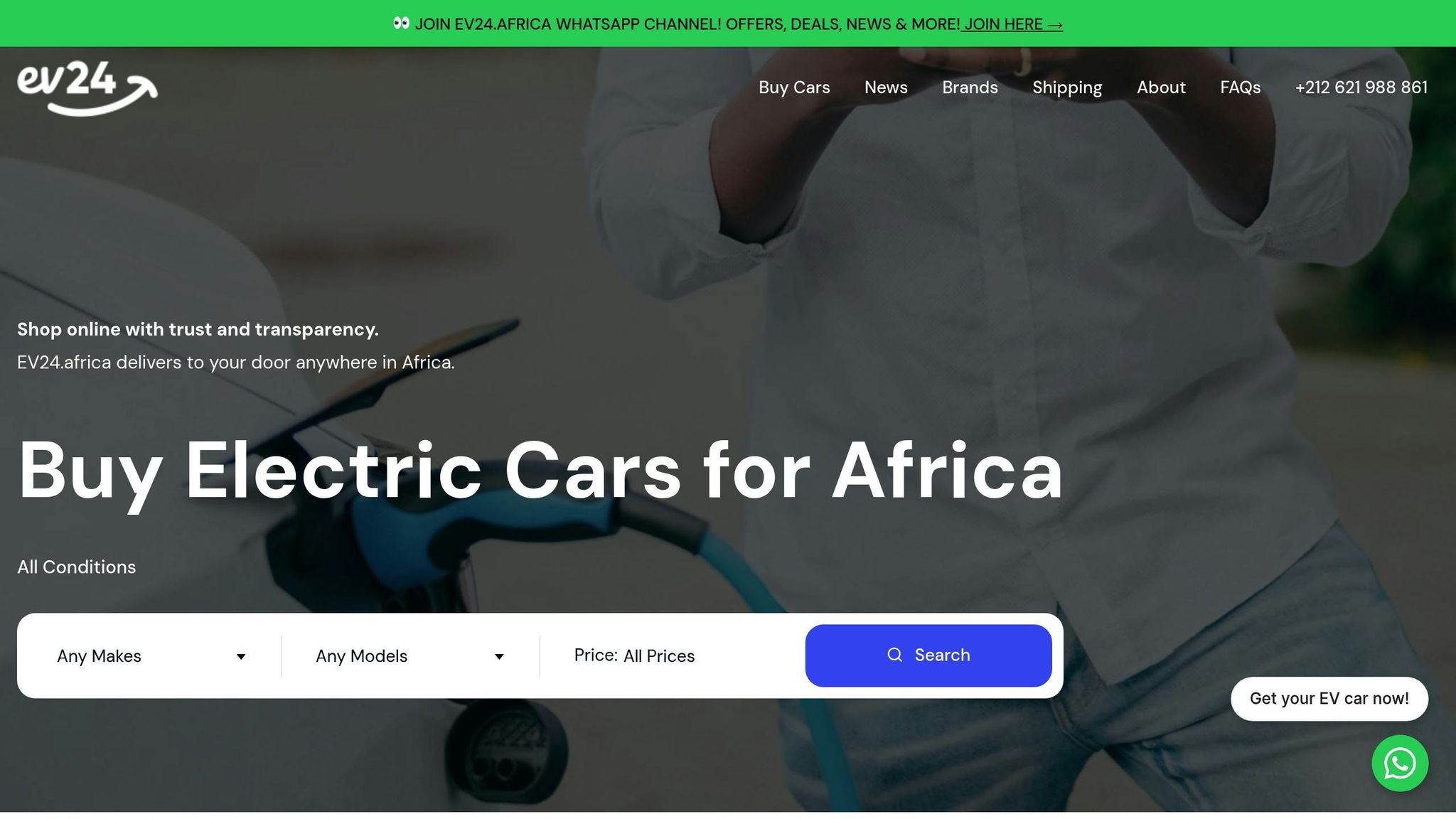
EV24.africa is tackling the practical challenges Nigerian EV buyers face by addressing issues around infrastructure, costs, and logistics. The platform simplifies the process of importing and purchasing EVs by offering transparent pricing, flexible financing options, and a curated selection of brands like Tesla, BYD, Volkswagen, Leapmotor, and Geely.
Beyond just sales, EV24.africa provides end-to-end logistics support, including hassle-free shipping, customs clearance, and local registration. To further assist buyers, the platform offers ongoing support such as charger installation and maintenance, ensuring reliable access to charging and technical assistance. This comprehensive approach helps make owning an EV in Nigeria a more seamless experience.
FAQs
What are the biggest challenges of charging electric cars in Nigeria, and how can they be solved?
The main obstacles to charging electric cars in Nigeria are the lack of sufficient charging stations, unreliable electricity supply, and the steep initial costs of setting up charging infrastructure. These hurdles make it tough for many drivers to embrace electric vehicles (EVs) and use them conveniently.
To overcome these issues, Nigeria could work on expanding the network of charging stations, particularly in cities and along major highways. Incorporating solar power and other renewable energy options can help reduce dependence on the country’s unstable power grid. Encouraging collaboration between public and private sectors might also attract investments in EV infrastructure, making it more affordable and accessible for drivers. Addressing these challenges could pave the way for broader EV adoption in Nigeria, improving convenience and practicality for users.
How does the cost of owning an electric car in Nigeria compare to a traditional gas-powered car over time?
Electric vehicles (EVs) tend to come with a higher upfront price tag compared to gas-powered cars. However, they often prove to be more wallet-friendly in the long run. One big reason? EVs have fewer moving parts, which means less wear and tear and no need for oil changes. On top of that, charging an EV – especially at home or using renewable energy – usually costs less than filling up a gas tank.
Although the initial cost might feel hefty, the savings on maintenance and fuel over time can make EVs a smart financial decision for many drivers in Nigeria. These long-term benefits can gradually balance out the upfront expense, making EVs a practical and cost-effective choice down the road.
What should I look for in an electric car to handle Nigeria’s roads and weather effectively?
When selecting an electric car for Nigeria’s roads and climate, it’s important to focus on features that ensure durability and reliable performance in challenging conditions.
- Robust suspension systems: These are crucial for navigating rough and uneven terrain while maintaining comfort and safety.
- Sufficient ground clearance: This helps protect the vehicle from damage caused by potholes and poorly maintained roads.
- Reliable air conditioning: A dependable cooling system is a must for staying comfortable in Nigeria’s hot weather.
By prioritizing these features, you’ll find an EV that can handle the local environment and deliver a smooth, dependable ride.


